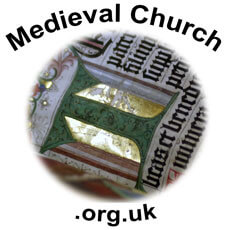 |
James E.
Biechler, "Nicholas of Cusa and the End of the Conciliar Movement," Church
History 44.1 (1975): 5-21. |
 |
James E.
Biechler, "Christian Humanism Confronts Islam: Sifting the Quran With Nicholas
of Cusa," Journal of Ecumenical Studies 13.1 (1976): 1-14. |
 |
James
E Biechler, Religious Language of Nicholas of Cusa. Scholars Press, US,
1982. Pbk. ISBN: 089130021X. pp.240. |
 |
Lawrence
Bond, "Nicholas of Cusa: 'On Presidential Authority in a General Council'," Church History 59.1 (1990): 19-34. |
 |
Peter
Casarella, "Cardinal Nicholas of Cusa: An Introduction," Communio:
International Catholic Review 28.4 (2001): 843-853. |
 |
B.
Christianson & T.M. Izbicki, Nicholas of Cusa: in Search of God and
Wisdom. Leiden: E J Brill, 1991. Hbk. ISBN: 9004093621. pp.298. |
 |
Gerald
Christianson & Thomas Izbicki, eds. Nicholas of Cusa on Christ and the
Church. Leiden: E J Brill, 1996. Hbk. ISBN: 9004105190. pp.352. |
 |
 F. Edward Cranz, Thomas M.
Izbicki & Gerald Christianson, eds. Nicholas of Cusa and the
Renaissance. Variorum, 2000. Hbk. ISBN: 0860788016. pp.220. F. Edward Cranz, Thomas M.
Izbicki & Gerald Christianson, eds. Nicholas of Cusa and the
Renaissance. Variorum, 2000. Hbk. ISBN: 0860788016. pp.220. |
 |
Donald F.
Duclow, "Gregory of Nyssa and Nicholas of Cusa: Infinity, Anthropology and the
Via Negativa," Downside Review 92.2 (1974): 102-108. |
 |
M.L. Fuhrer,
"Purgation, Illumination, and Perfection in Nicholas of Cusa," Downside
Review 98(332): (1980): 169-189. |
 |
Henry Heller,
"Nicholas of Cusa and Early French Evangelicalism," Archiv fur
Reformationsgeschichte 63.1 (1972): 6-21. |
 |
Erwin R.
Gane, "The Intellect-Will Problem in the Thought of Some Northern Renaissance
Humanists: Nicholas of Cusa," Andrews University Seminary Studies 12.2
(1974): 83-93. |
 |
William J.
Hoye, "The Meaning of Neoplatonism in the Thought of Nicholas of Cusa," Downside Review 104(354) (1986): 10-18. |
 |
Thomas
M. Izbicki & Christopher M. Bellitto, eds. Nicholas of Cusa and His Age:
Intellect and Spirituality. Leiden: E J Brill, 2002. Hbk. ISBN: 9004125574.
pp.285. |
 |
E.F. Jacob,
"Nicolas of Cusa" F.J.C. Hearnshaw, ed. The Political and Social Ideas of
Some Great Thinkers of the Renaissance and Reformation. 1925.
32-59. |
 |
E.F. Jacob,
"Casunas the Theologian," Bulletin of the John Rylands Library 21
(1937): 406-24. |
 |
Raymond
Klibansky, The Continuity of the Platonic Tradition During the Middle Ages.
Outlines of a Corpus Platonicum Medii Aevi. London: Kraus International
Publications, 1982. Hbk. ISBN: 0527501301. |
 |
Raymond
Klibansky, "Plato's Parmenides in the Middle Ages and the Renaissance," Mediaeval and Renaissance Studies 1 (1943): 281-330. |
 |
Peter L.
McDermott, "Nicholas of Cusa: Continuity and Conciliation at the Council of
Basel," Church History 67.2 (1998): 254-273. |
 |
John Milbank,
"Man as Creative and Historical Being in the Theology of Nicholas of Cusa," Downside Review 97(329) (1979): 245-259. |
 |
C.L. Miller,
"Aristolelian Natura and Nicholas of Cusa," Downside Review 96(322):
(1978): 13-20. |
 |
Julie C.
Norman, "Nicholas of Cusa, Apostolate of Unity," Downside Review 99(334)
(1981): 59-74. |
 |
Sebastian
Painadath, "Coincidentia Oppositorum: Nicholas of Cusa in Search of the Harmony
of Religions," Vidyajyoti Journal of Theological Reflection 60.7 (1996):
455-460. |
 |
Nicholas
Rescher, "Nicholas of Cusa on the Qur'an - A Fifteenth Century WEncounter With
Islam," Muslim World 55 (1965): 195-202. |
 |
Paul Eugene
Sigmunde, Nicholas of Cusa and Medieval Political Thought. Cambridge,
MA: Harvard University Press, 1963. |
 |
Morimichi
Watanabe, The Political Ideas of Nicholas of Cusa, with speical reference to
his De concordantia catholica. Travaux d'humanisme et renaissance, 58.
Geneva: Ambilly-Annemasse, 1963. pp.214. |
 |
Morimichi
Watanabe, "The Episcopal Election of 1430 in Trier and Nicholas of Cusa," Church History 39.3 (1970): 299-316. |
 |
 Kazuhiko Yamaki, ed. Nicholas of Cusa. Routledge / Curzon, 2001. Hbk. ISBN: 0700716718.
pp.288. Kazuhiko Yamaki, ed. Nicholas of Cusa. Routledge / Curzon, 2001. Hbk. ISBN: 0700716718.
pp.288. |
 F. Edward Cranz, Thomas M.
Izbicki & Gerald Christianson, eds. Nicholas of Cusa and the
Renaissance. Variorum, 2000. Hbk. ISBN: 0860788016. pp.220.
F. Edward Cranz, Thomas M.
Izbicki & Gerald Christianson, eds. Nicholas of Cusa and the
Renaissance. Variorum, 2000. Hbk. ISBN: 0860788016. pp.220.  Kazuhiko Yamaki, ed. Nicholas of Cusa. Routledge / Curzon, 2001. Hbk. ISBN: 0700716718.
pp.288.
Kazuhiko Yamaki, ed. Nicholas of Cusa. Routledge / Curzon, 2001. Hbk. ISBN: 0700716718.
pp.288. 







 Nicholas of Cusa, The
Catholic Concordance, Paul E. Sigmund, ed. Cambridge: Cambridge University
Press, 1996. Pbk. ISBN: 0521567734. pp.375.
Nicholas of Cusa, The
Catholic Concordance, Paul E. Sigmund, ed. Cambridge: Cambridge University
Press, 1996. Pbk. ISBN: 0521567734. pp.375. Nicholas of Cusa, Selected
Writings. Classics of Western Spirituality, H. Lawrence Bond, translator.
New York: Paulist Press, 1997. Hbk. ISBN: 0809136988.
Nicholas of Cusa, Selected
Writings. Classics of Western Spirituality, H. Lawrence Bond, translator.
New York: Paulist Press, 1997. Hbk. ISBN: 0809136988.


